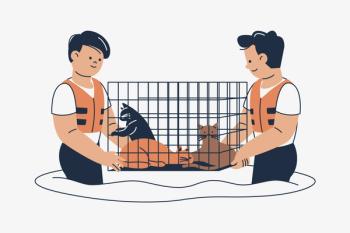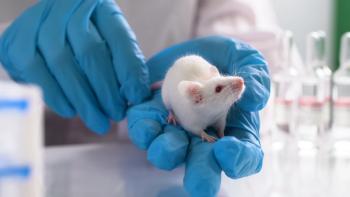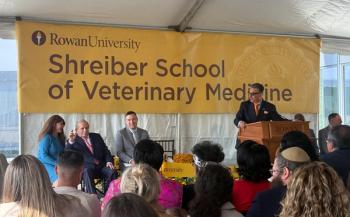
A house divided?
New Orleans - Veterinarians once again squared off on animal-welfare and human-health issues at this year's American Veterinary Medical Association (AVMA) House of Delegates meeting.
New Orleans — Veterinarians once again squared off on animal-welfare and human-health issues at this year's American Veterinary Medical Association (AVMA) House of Delegates meeting.
The most contentious issues focused on antimicrobial use in livestock feeds for growth promotion and on veal-husbandry practices. DVMs on both sides dug in their heels.
"The AVMA has a membership made up of very diverse professionals within our larger profession," says Rhode Island delegate Dr. Gary Block. "It's perfectly understandable that the small-animal vet, who doesn't see animals as a means to an end, may have very different views compared to people who work with production animals.
"If a cow is worth more to slaughter than to treat, they're going to slaughter. Small-animal veterinarians, on the other hand, have people spending an exorbitant amount of money for an animal that has virtually zero monetary worth," Block says.
It's a reality that is driving a more apparent philosophical divide among veterinarians. Block believes these are the issues of all veterinarians and that the AVMA needs to start being proactive rather than reactive. "I think the AVMA is losing some credibility by either their inability or their unwillingness to be proactive on animal-welfare issues," Block says.
California delegate Dr. George Bishop says differing philosophies are a contributing factor to the inability of AVMA to agree on some of these hot-button topics. "I'm a small-animal vet and then there are large-animal people," Bishop says.
"We all have feelings on issues that may not be science-based, but relate to our individual industry."
Those feelings lead to prejudices in favor of one's own opinion, rather than focusing on the science of the issue, Bishop adds.
No matter what the disparity, the 145th annual AVMA convention's House of Delegates meeting was ripe with discord.
A resolution banning the use of antimicrobials as growth promoters in livestock feed didn't even make it to the floor after less than two-thirds of voters rejected waiving the time requirement of the bill.
However, the vote was close, with 50.2 percent in favor of waiving it and 49.8 percent against.
Five votes were required before Resolution 16, which deals with veal- husbandry practices, passed by a vote of 88.7 percent to 11.3 percent.
Delegates openly debated the merits of whether to support a new policy on veal-husbandry practices.
They held closeted discussions on the antimicrobials issue.
And all the while, AVMA President James Cook talked about the organization establishing itself as the go-to agency for animal-health and welfare inquiries.
"It's upsetting when we're labeled supporters of horse slaughter, when in actuality, we see the humane disposal as a current necessity to address the true issue — the tens of thousands of unwanted horses," Cook says, citing a recent example of how the AVMA has to do a better job of communicating with the media and the public.
"In order to be identified as the go-to organization for animal issues, we must become the fastest responder, with compassionate, accurate, trustworthy and scientifically based info."
Just remember the acronym CATS, Cook instructs — Compassionate, Accurate, Trustworthy and Scientific.
"I would like to see an in-house, quick response, camera-ready media center which will readily allow us to meet that need," Cook says.
While Cook acknowledges it will be hard, especially when its budget for such action is dwarfed by the $123 million the Humane Society of the United States spends on "so-called educational efforts," it still can be done.
It must be done, Cook says.
Many delegates felt they were taking a step in that direction by voting in favor of changes to the veal-husbandry practices. But some, like New Jersey veterinarian Robert Gordon, felt AVMA took a step backward by not even discussing the use of antimicrobials as growth promoters in livestock feeds.
"If we want to continue doing things the way we have done them for the past 30 years, we will not be leaders," Gordon says. "The AVMA is a traditional, conservative organization. I don't think anyone would argue with that. And change at the AVMA moves slowly. But we're here to have scientific, intellectual discussions, and we just voted that away."
While Gordon hasn't heard any open lamenting about a companion animal veterinarian sticking his stethoscope where it doesn't belong — on the farm — he's sure that sentiment is out there.
Dr. Thomas Burkgren, executive director of the American Association of Swine Veterinarians, has been privy to the argument against use of antimicrobials as growth promoters for years.
He knows he won't change a companion- animal veterinarian's mind, just as he knows they won't change his.
Still, he isn't opposed to a little debate, as he proved during an impromptu discussion on the topic in a committee meeting.
"We have to look at the unintended consequences," Burkgren says.
"This is just a knee-jerk action. Let's ban all of it. It doesn't involve me. I'm a dog-and-cat guy."
Along with the healthy debate throughout the conference, AVMA dele-gates also elected Dr. Larry Corry of Georgia president-elect of the AVMA and Dr. Gary Brown of West Virginia vice president, as well as electing several others to various positions.
Ultimately, Cook told those gathered that AVMA is trying to be more proactive than reactive in all of its endeavors, whether promoting animal health, human health or advancing the profession, reaching out to students or working for equal compensation for female veterinarians.
"The vulnerability of our country to disease-related events, either through production or acts of terrorism increases daily," Cook told the delegates.
"We all know total prevention is not possible, so the ability for a quick, aggressive response is essential. That cannot be accomplished without an adequate work force of trained veterinary professionals."
Cook says the executive board has set aside funds to advance the AVMA's strategic goals of advocacy, economic viability, work-force expansion, education and welfare.
"Along with our mission and the leadership role we play in protecting our food supply, if human vaccination is not counted, I'll bet we have a greater impact than physicians on the promotion of human health," Cook says.
"Our role as advocates for veterinary medicine is critical in ensuring legislators know the important role veterinarians play in our country's future."
Newsletter
From exam room tips to practice management insights, get trusted veterinary news delivered straight to your inbox—subscribe to dvm360.




